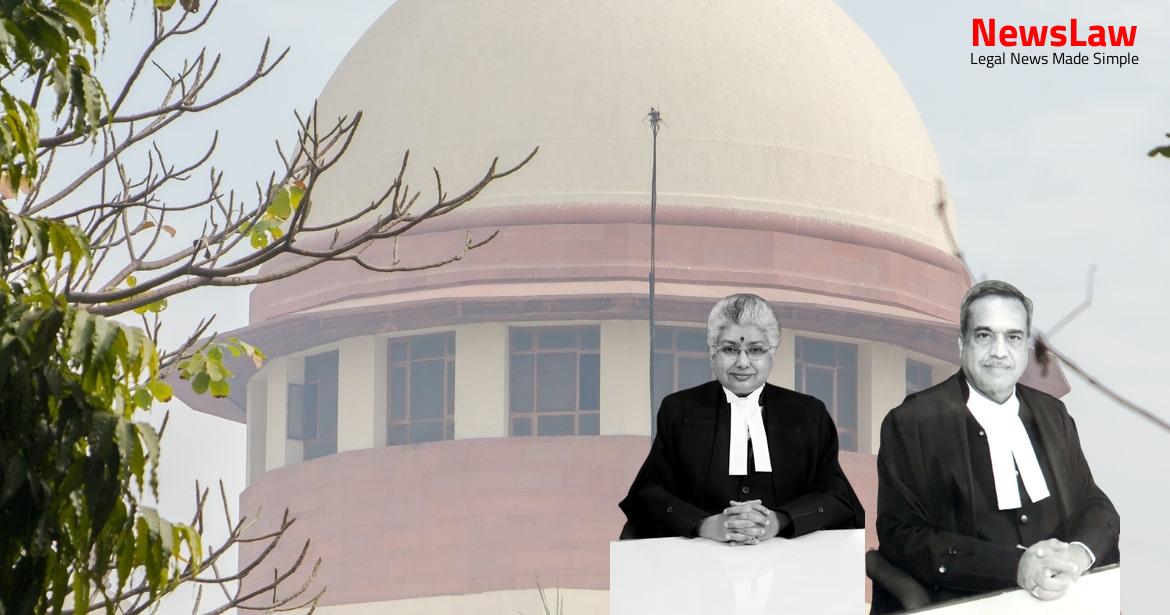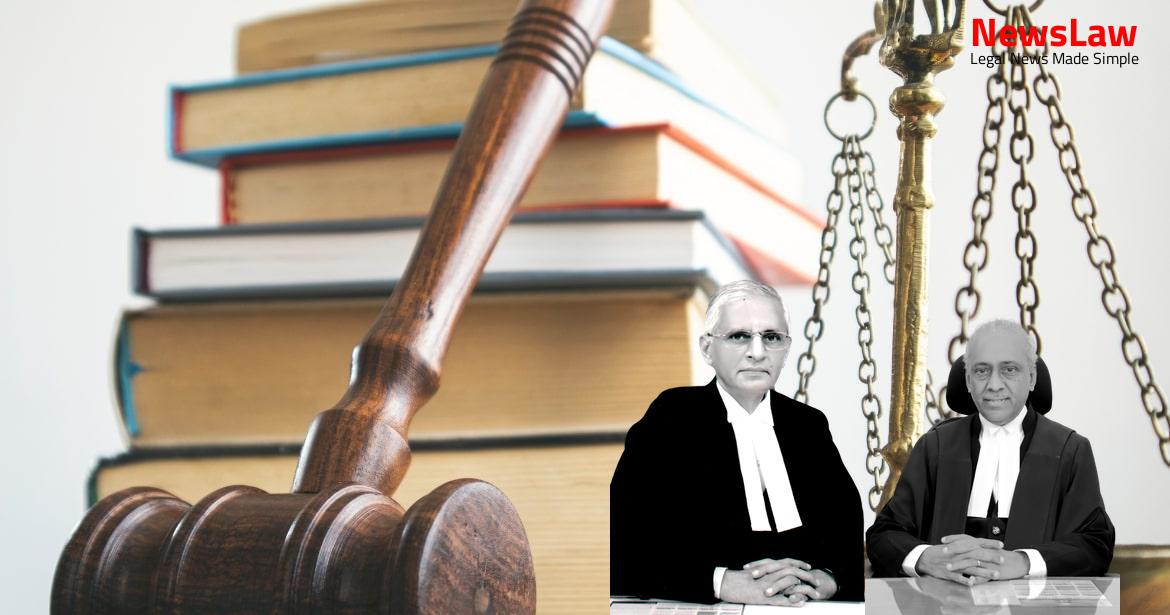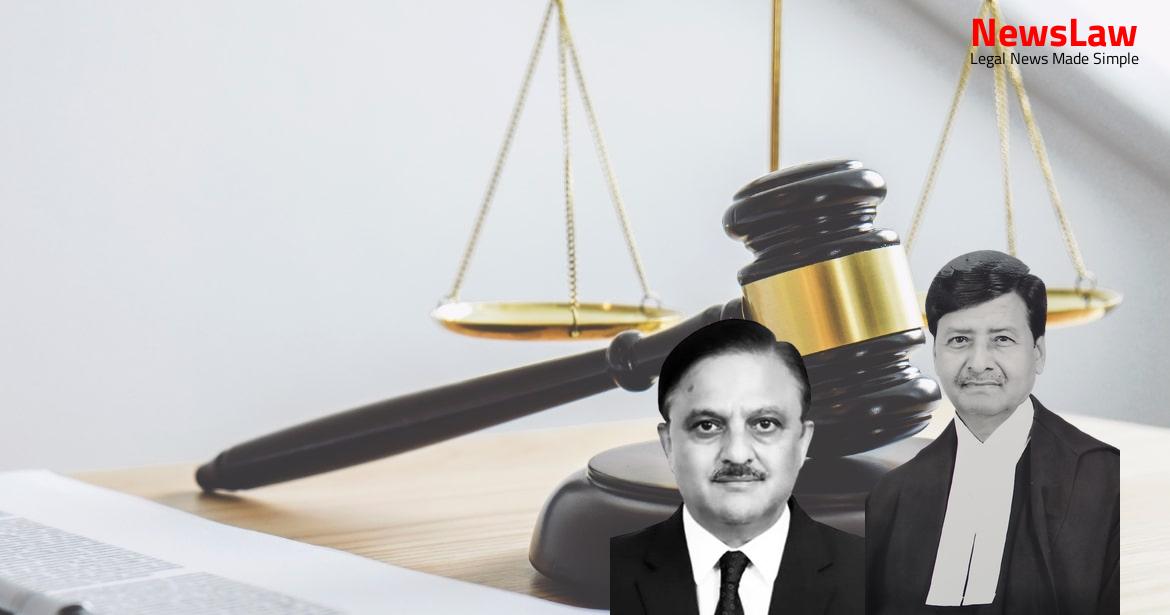Delve into the intricate legal analysis of disciplinary proceedings and judicial review highlighted in a recent case. The focus is on the court’s interpretation and application of legal principles in assessing the validity of administrative actions. Discover how the court navigates through evidence, natural justice principles, and decision-making processes in upholding justice and fairness.
Facts
- The respondent, a delinquent officer, was working as a Deputy Manager (Cash) at SSI Peenya II Stage Branch of SBI Bank in Bangalore.
- The delinquent officer fraudulently withdrew Rs.10 lakhs based on a forged letter dated 06.08.1996.
- The learned Single Judge set aside the order of punishment, directing the Bank to provide consequential benefits to the delinquent officer without back wages as he had already attained superannuation.
- The Appointing Authority agreed with the Enquiry Officer’s findings and imposed the penalty of dismissal, which was confirmed by the Appellate Authority.
- The Division Bench of the High Court dismissed both appeals – one by the appellant (management) and the other by the delinquent officer.
- The respondent – delinquent officer was charged with preparing fraudulent cash remittance documents on August 6, 1996, and obtaining Rs.10 lakhs from the SSI Peenya II Stage Branch through deception.
- The delinquent officer failed to account for the Rs.10 lakhs in the books of the SSI Peenya II Stage Branch, leading to a loss for the bank.
- A false letter dated 06.08.1996, purportedly signed by A.R. Balasubramanian, the AGM of the SSI Branch, was produced to withdraw the Rs.10 lakhs, which remained unaccounted for.
- The amount withdrawn from Peenya Industrial Estate Branch was meant to be deposited at the SSI Branch but was not accounted for or deposited as per the records.
- A complaint was submitted to the CBI by the local Head Officer on 10.11.1998, leading to the registration of an FIR.
- It was revealed during preliminary investigations that the fraud was committed by an insider who was well-versed with the cash remittance procedures and the signature of the Branch Manager.
Also Read: Ruling on Circumstantial Evidence in Murder Case
Arguments
- Appellant argues that the High Court erred in not recognizing the clinching evidence against the respondent in the alleged offense.
- The learned Single Judge found the enquiry to be flawed due to the violation of natural justice principles.
- Witnesses PW5 and PW6 confirmed the respondent’s involvement in a cash remittance incident at the Branch.
- The management successfully proved that the fraudulent letter was prepared by the respondent.
- PW7, the proprietor of the photo stating shop, identified the respondent as the person who came to type the fraudulent letter.
- The management established that the voucher and cash were handed to the respondent inside the vault through witnesses and documents.
- Counsel relies on the case of State of Karnataka vs N. Ganga Raj to highlight the scope of judicial review.
- The Bank produced 41 documents and examined 9 witnesses during the enquiry to support the charges.
- The impugned judgment of the Division Bench was challenged for interfering with the findings of the Enquiry Officer based on evidence.
- The learned Single Judge and Division Bench were accused of exceeding their jurisdiction in overturning the punishment imposed by the appointing authority.
- The respondent delinquent officer had an unblemished record over 28 years with two promotions.
- The High Court’s judgment and orders are argued to not be interfered with under Article 136 of the Constitution of India.
- The appellant argues that granting terminal benefits and pension to the delinquent officer would be rewarding dishonesty.
- The age of superannuation of the delinquent officer makes a fresh inquiry burdensome, thus seeking the administrative action itself to be set aside.
- The appellant asserts that the delinquent officer should be reinstated with full back wages, contrary to the High Court’s decision denying back wages.
- An amount of Rs.10 lakhs was allegedly paid to another individual rather than the respondent delinquent officer.
Also Read: Challenging Legal Presumptions in Negotiable Instrument Cases
Analysis
- The High Court is not a court of appeal over the decision of the authorities holding a departmental enquiry against a public servant.
- The High Court’s role is to ensure that the enquiry is conducted by a competent authority according to prescribed procedures and without violating the rules of natural justice.
- Judicial review is not an appeal but a review of the manner in which the decision is made.
- The High Court should not reappreciate the evidence or act as an appellate authority in departmental enquiries.
- The High Court may interfere if the authority’s decision is based on no evidence, violates natural justice, or is arbitrary or capricious.
- The standard of proof in criminal proceedings differs from that in departmental enquiries.
- The courts will not interfere in findings of fact in departmental enquiries unless they are based on no evidence or are clearly perverse.
- Courts will not reassess evidence in domestic enquiries or correct errors of fact if the enquiry was properly held and findings are evidence-based.
- The High Court cannot act as an appellate authority while reappreciating evidence in disciplinary proceedings.
- The power of judicial review is limited to the decision-making process, not the evidence itself.
- The management was able to prove the chain of events leading to the conclusion of the delinquent officer’s involvement in preparing a false letter and misappropriating Rs. 10 lakhs.
- The acquittal of the officer in criminal court does not impact disciplinary proceedings’ findings or validity.
- In disciplinary proceedings, the standard of proof differs from criminal cases.
- The disciplinary authority has the final say on facts, and evidence reliability cannot be challenged later.
- The high court erred in reevaluating evidence and overturning the disciplinary authority’s decision.
- The Enquiry Officer found the delinquent officer guilty based on documentary and oral evidence.
- The judiciary’s role in disciplinary proceedings is not that of an appellate authority but to ensure reasonableness in the decision.
- The appellate authority must reexamine evidence and evaluate the nature of punishment, ensuring it aligns with the facts of the case.
- The delinquent officer went along with a false and fabricated document introducing a new cashier to ensure no evidence of receiving money
- This demonstrates a criminal mindset and conduct on the part of the delinquent officer
- The disciplinary authority did not commit any error in dismissing the delinquent officer from service
- The judgments of the Division Bench and the learned Single Judge are quashed and set aside
Also Read: Legal Analysis of Admission Irregularities in Educational Institutions
Decision
- The order passed by the Management dismissing the respondent – delinquent officer on proved charge and misconduct is hereby restored.
- In the facts and circumstances of the case, there shall be no order as to costs.
Case Title: STATE BANK OF INDIA Vs. K.S. VISHWANATH (2022 INSC 616)
Case Number: C.A. No.-003490-003490 / 2022



